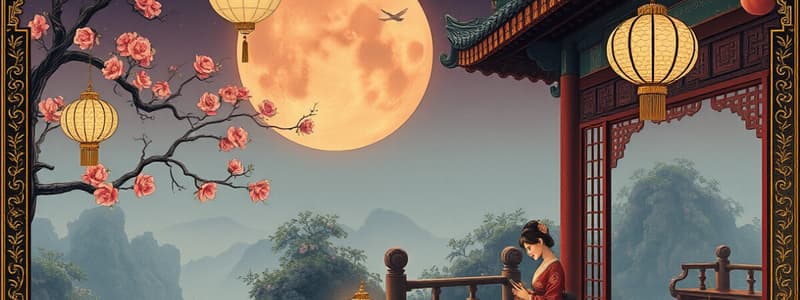Podcast
Questions and Answers
What event marked the end of the Qing Dynasty and the abdication of the emperor?
What event marked the end of the Qing Dynasty and the abdication of the emperor?
- Taiping Rebellion
- Meiji Restoration
- 1911 Revolution (correct)
- Boxer Rebellion
Who published the first Japanese-language book on photographic techniques?
Who published the first Japanese-language book on photographic techniques?
- Shimazu Nariakira
- Kawamoto Komin (correct)
- Hiroshige Utagawa
- Hokusai Katsushika
Which term describes the Japanese tourist photography style that became popular in Yokohama?
Which term describes the Japanese tourist photography style that became popular in Yokohama?
- Nagasaki style
- Edo shashin
- Kabuki photography
- Yokohama shashin (correct)
During which period did photography begin in Japan?
During which period did photography begin in Japan?
What major Western influence brought photography technology to Asia in the 1840s?
What major Western influence brought photography technology to Asia in the 1840s?
What photographic process was successfully used to create the first portrait in Japan?
What photographic process was successfully used to create the first portrait in Japan?
What was the significance of the arrival of photography in China?
What was the significance of the arrival of photography in China?
What kind of photography became prominent as a souvenir market in Japan?
What kind of photography became prominent as a souvenir market in Japan?
Which dynasty ruled China when photography was first introduced in the 19th century?
Which dynasty ruled China when photography was first introduced in the 19th century?
What year did the first successful photograph in Japan occur?
What year did the first successful photograph in Japan occur?
What was the primary focus of the exhibition, Masterpieces of Early Chinese Photography?
What was the primary focus of the exhibition, Masterpieces of Early Chinese Photography?
Which term describes the style of photography that became popular as souvenirs in Japan?
Which term describes the style of photography that became popular as souvenirs in Japan?
What was the technology that brought photography to Asia in the 1840s?
What was the technology that brought photography to Asia in the 1840s?
What was a significant societal change occurring in China during the introduction of photography?
What was a significant societal change occurring in China during the introduction of photography?
What was unique about the photographs known as Yokohama-style photography?
What was unique about the photographs known as Yokohama-style photography?
Who were the main influencers in introducing photography to Japan?
Who were the main influencers in introducing photography to Japan?
What characterized the photography scene in China during the early introduction of the medium?
What characterized the photography scene in China during the early introduction of the medium?
Which factor contributed to the interest in photography among early Japanese audiences?
Which factor contributed to the interest in photography among early Japanese audiences?
What was a major impact of photography's introduction in China during the Qing Dynasty?
What was a major impact of photography's introduction in China during the Qing Dynasty?
Which aspect distinguished Yokohama-style photography in Japan?
Which aspect distinguished Yokohama-style photography in Japan?
What was the consequence of the fall of the Qing Dynasty in relation to photography?
What was the consequence of the fall of the Qing Dynasty in relation to photography?
How did early Japanese photographers primarily gain knowledge of photography?
How did early Japanese photographers primarily gain knowledge of photography?
What role did Western travelers play in the development of photography in Asia?
What role did Western travelers play in the development of photography in Asia?
What was the significance of Kawamoto Komin in the history of Japanese photography?
What was the significance of Kawamoto Komin in the history of Japanese photography?
Flashcards are hidden until you start studying
Study Notes
Late Qing Dynasty Photography
- Exhibition Overview: The exhibition "Masterpieces of Early Chinese Photography" features photographs from the largest private collection of historical photos of China, held by the 19th Century Rare Book and Photograph Shop.
- Introduction to Photography: Western travelers brought photography technology to Asia in the 1840s, coinciding with the Qing Dynasty's rule since the 17th century.
- Cultural Impact: The introduction of photography coincided with a transformative period in China, capturing a lifestyle that largely disappeared following the Qing Dynasty's fall in the early 20th century.
- Modernization: Prior to the revolution of 1911, China began embracing modernization, influenced by global industrialization trends.
Meiji Era Japan Photography
- Edo Period Origins: Photography was introduced to Japan during the Edo period by Dutch merchants in Dejima, initially captivating a small audience.
- First Japanese Photography Book: Kawamoto Komin published "Ensei-Kikijutsu" in 1854, marking the first Japanese-language guide on photographic techniques.
- First Successful Photograph: In 1857, two Japanese photographers created Japan's first successful photograph, a portrait of Satsuma clan lord Shimazu Nariakira, using daguerreotype methods.
- Yokohama Shashin: A new market for souvenir photography developed in Yokohama, known as Yokohama-style photography, characterized by hand-colored, decorative, and staged images.
- Photography Albums: Albums contained 25 to 100 prints focusing on three categories: customs/types, women, and famous places/views. An album by Baron Raimund von Stillfried in 1872 cost around $48.
Kintsugi
- Art of Kintsugi: Kintsugi involves repairing broken pottery with lacquer, embracing the visible fractures as a part of the object's history.
- Philosophical Discussion: Consideration of whether the kintsugi approach should also apply to reconstructing other historical objects or treating individuals with disfiguring injuries.
Late Qing Dynasty Photography
- Exhibition Overview: The exhibition "Masterpieces of Early Chinese Photography" features photographs from the largest private collection of historical photos of China, held by the 19th Century Rare Book and Photograph Shop.
- Introduction to Photography: Western travelers brought photography technology to Asia in the 1840s, coinciding with the Qing Dynasty's rule since the 17th century.
- Cultural Impact: The introduction of photography coincided with a transformative period in China, capturing a lifestyle that largely disappeared following the Qing Dynasty's fall in the early 20th century.
- Modernization: Prior to the revolution of 1911, China began embracing modernization, influenced by global industrialization trends.
Meiji Era Japan Photography
- Edo Period Origins: Photography was introduced to Japan during the Edo period by Dutch merchants in Dejima, initially captivating a small audience.
- First Japanese Photography Book: Kawamoto Komin published "Ensei-Kikijutsu" in 1854, marking the first Japanese-language guide on photographic techniques.
- First Successful Photograph: In 1857, two Japanese photographers created Japan's first successful photograph, a portrait of Satsuma clan lord Shimazu Nariakira, using daguerreotype methods.
- Yokohama Shashin: A new market for souvenir photography developed in Yokohama, known as Yokohama-style photography, characterized by hand-colored, decorative, and staged images.
- Photography Albums: Albums contained 25 to 100 prints focusing on three categories: customs/types, women, and famous places/views. An album by Baron Raimund von Stillfried in 1872 cost around $48.
Kintsugi
- Art of Kintsugi: Kintsugi involves repairing broken pottery with lacquer, embracing the visible fractures as a part of the object's history.
- Philosophical Discussion: Consideration of whether the kintsugi approach should also apply to reconstructing other historical objects or treating individuals with disfiguring injuries.
Late Qing Dynasty Photography
- Exhibition Overview: The exhibition "Masterpieces of Early Chinese Photography" features photographs from the largest private collection of historical photos of China, held by the 19th Century Rare Book and Photograph Shop.
- Introduction to Photography: Western travelers brought photography technology to Asia in the 1840s, coinciding with the Qing Dynasty's rule since the 17th century.
- Cultural Impact: The introduction of photography coincided with a transformative period in China, capturing a lifestyle that largely disappeared following the Qing Dynasty's fall in the early 20th century.
- Modernization: Prior to the revolution of 1911, China began embracing modernization, influenced by global industrialization trends.
Meiji Era Japan Photography
- Edo Period Origins: Photography was introduced to Japan during the Edo period by Dutch merchants in Dejima, initially captivating a small audience.
- First Japanese Photography Book: Kawamoto Komin published "Ensei-Kikijutsu" in 1854, marking the first Japanese-language guide on photographic techniques.
- First Successful Photograph: In 1857, two Japanese photographers created Japan's first successful photograph, a portrait of Satsuma clan lord Shimazu Nariakira, using daguerreotype methods.
- Yokohama Shashin: A new market for souvenir photography developed in Yokohama, known as Yokohama-style photography, characterized by hand-colored, decorative, and staged images.
- Photography Albums: Albums contained 25 to 100 prints focusing on three categories: customs/types, women, and famous places/views. An album by Baron Raimund von Stillfried in 1872 cost around $48.
Kintsugi
- Art of Kintsugi: Kintsugi involves repairing broken pottery with lacquer, embracing the visible fractures as a part of the object's history.
- Philosophical Discussion: Consideration of whether the kintsugi approach should also apply to reconstructing other historical objects or treating individuals with disfiguring injuries.
Studying That Suits You
Use AI to generate personalized quizzes and flashcards to suit your learning preferences.




